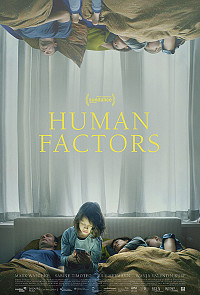| SHADOWS ON THE WALL | REVIEWS | NEWS | FESTIVAL | AWARDS | Q&A | ABOUT | TALKBACK | |||||||||||||||||||||
 Shadows off the beaten path Shadows off the beaten pathIndies, foreign, docs and shorts...
On this page:
THE FEVER |
HUMAN FACTORS |
JOSEE, THE TIGER AND THE FISH
| |||||||||||||||||||||
| See also: SHADOWS FILM FESTIVAL | Last update 6.Aug.21 | |||||||||||||||||||||
|
The Fever A Febre Review by Rich Cline | 
| |||||||||||||||||||||
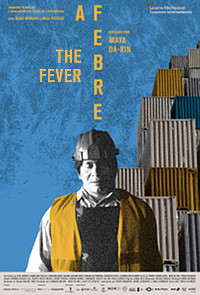 dir Maya Da-Rin scr Pedro Cesarino, Maya Da-Rin, Miguel Seabra Lopes prd Maya Da-Rin, Juliette Lepoutre, Leonardo Mecchi with Regis Myrupu, Rosa Peixoto, Johnatan Sodre, Edmildo M Vaz Pimentel, Anunciata Teles Soares, Kaisaro Jussara Brito, Rodson Vasconcelos, Lourinelson Wladmir, Suzy Lopes, Erismar Fernandes Rodrigues, Dalvina Pinto Neves, Sandro Medeiros release Br Dec.19 riff, US 4.Aug.20, UK 6.Aug.21 19/Brazil 1h38 TORONTO FILM FEST Is it streaming? |
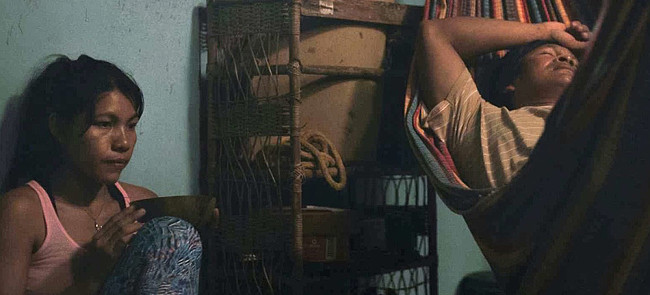 Invitingly shot to capture thoughts and moods without much dialog, this Brazilian drama also uses its tropical setting to great effect. Following an indigenous Desana man working on the banks of the Amazon, gifted director Maya Da-Rin establishes rhythms that feel almost documentary-like in the way the camera reveals everyday situations that have bigger resonance. This observational approach is utterly riveting, and where it goes is simply beautiful. In Manaus, 45-year-old widower Justino (Myrupu) has a strange illness that makes him sleepy while working security in the port. Then in the night, the fever makes him feel like a creature is stalking him. He's proud of his daughter Vanessa (Peizoto), a nurse preparing to move to Brasilia to study medicine. But she's nervous about leaving her father alone. And even as he begins to have strange dreams, he carries on with his job and homelife, while also trying to fend off his wider family as they try to sort out his life. Culture and class infuse each atmospheric scene. In Vanessa's clinic it's a challenge to speak to people from tribal villages who don't speak a common language. Justino is reluctant to accept help from his employer, even after he's given a warning for falling asleep. Meanwhile, His illness adds an almost hallucinatory element that brings some understated tension to the film. But Da-Rin's approach remains intimate and revelatory, never falling back on easy plot points to propel the story. Performances are so natural that it seems like people are playing themselves, and this is what their lives look like. The minimalistic dialog offers telling glimpses into personalities and connections using nuance and textures rather than obvious statements. At the centre Myrupu manages to infuse the sleepy Justino with a wry sense of wit and gritty determination, plus complex connections with others. Peixoto is superbly matter-of-fact as the brainy Vanessa, informing the dynamic between the extended family unit. Everyone on-screen adds intriguing angles to Justino's story. There are elements of bigotry woven into the fabric of the scenes, for example in the way that Justino's new colleague (Vladmir), who has European heritage, addresses him as an "Indian" and refers to his facial features. This informs Justino's sickness and makes Vanessa's achievement quietly thrilling. But because it remains in the fabric of the setting, rather than emerging as some sort of message, it has even more haunting power.
| ||||||||||||||||||||
|
Human Factors Der Menschliche Faktor Review by Rich Cline | 
SUNDANCE FILM FEST BERLIN FILM FEST  Is it streaming?
| 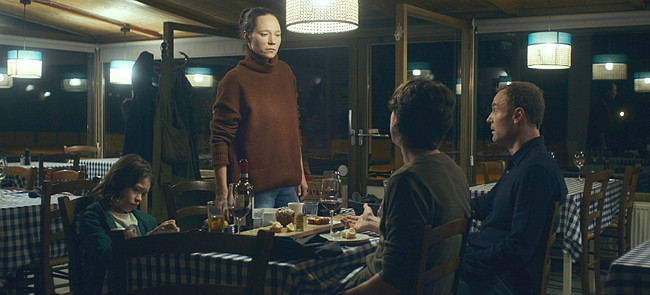 There's an intentionality to this dark German drama that holds the interest, even if writer-director Ronny Trocker makes everything far too enigmatic to properly connect with the audience. But then this is a film about disconnection, as a family is quietly pulled apart by a series of misunderstandings, clashing personalities and unnervingly insidious betrayals, some of which are unconscious. Still, letting the viewer in would have helped a lot. As a German family arrives at their holiday home in Belgium for the weekend, Nina (Timoteo) is shocked to spot intruders fleeing the house. Her husband Jan (Waschke) was out at the time, while teen daughter Emma (Hermann) only heard her mother's scream, and younger son Max (Kube) is bereft because the thieves have stolen his beloved pet rat. Back in Germany, Jan is considering a political client at the ad agency they jointly run. But Nina would rather leave than do that kind of work. And the Belgian police need to talk to them. The film skilfully reveals events through various perspectives, continually cycling back to see through different eyes. This reveals how decisions have been repeatedly made based on inaccurate observations or stubborn personal opinions. The problem is that this approach creates five more questions each time it answers one. Perhaps Trocker's point is that nothing is ever as clear as it may seem at the time. As if to echo this, he shoots everything in often low natural light, which gives the film a murky tone. And characters remain inscrutable. This approach allows the actors to do some complex things with their roles, offering glimpses of both guilt and naivete underneath the surface, in often jarring contrast to what they show each other. Many events are deliberately random, and by splitting and echoing points of view, the viewer's sympathies will depend on which of these vivid characters feels most familiar, if any. And while the four central roles remain sketchy, the side characters barely get a chance to register. At its centre, this is an inventive idea, exploring how we all make potentially life-changing decisions based on erroneous information. And it also says something about the fragility of relationships. As finely made as this is, perhaps Trocker could have found a way to get deeper under the skin of these characters, to help us feel for them. But without some earthier touches, this film feels long, repetitive and even a little obvious.
|
| Josee, the Tiger and the Fish Review by Rich Cline | 
| 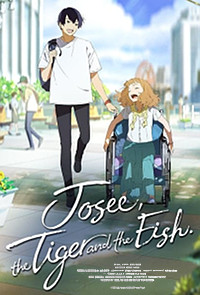 dir Kotaro Tamura scr Sayaka Kuwamura voices Taishi Nakagawa, Kaya Kiyohara, Yume Miyamoto, Kazuyuki Okitsu, Lynn, Matsutera Chiemi, Shintaro Moriyama, Kengo Kawanishi, Kanji Obana, Masaki Shimizu, Lili, Masaki Terasoma release Jpn 25.Dec.20, US 12.Jul.21, UK 13.Aug.21 20/Japan 1h39 Is it streaming?
| 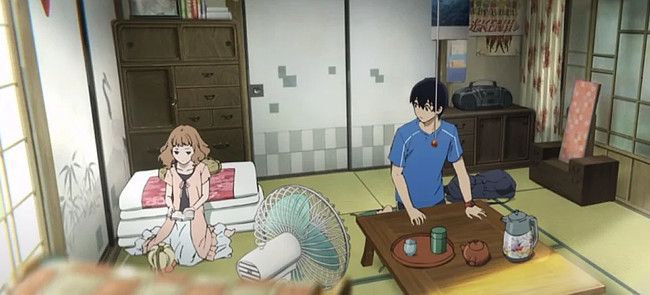 Combining a traditional anime aesthetic with elaborately detailed digital animation, this Japanese drama has a story and characters that instantly grab the imagination. And there's refreshing depth of meaning that cuts through the beautiful surfaces, making the film both engaging and insightful. Where the story goes is involving and sometimes even startling as it explores the impact personal connections have on our everyday reality, and our dreams as well. At 22, Tsuneo (Nakagawa) works in a dive shop, saving to go study in Mexico. Then he meets Josee (Kiyohara), who uses a wheelchair and lives with her grandmother (Chiemi). She offers Tsuneo a part-time assistant job, which means taking orders from the outrageously demanding Josee. After a rough start, Tsuneo discovers that Josee shares his passion for the sea, as she imagines she'll be freed from her chair in the water. And when she meets his dive buddies (Miyamoto and Okitsu), she's overwhelmed that he has the real life she only pretends to have. Everything about Tsuneo's life fascinates Josee, while her unique eye as a gifted artist offers Tsuneo a new perspective. As he accompanies her outside, she refuses to admit that her only experiences have been through books, dismissing Tsuneo as a "servant" and concealing the fact that he's breaking through her hard shell. And her grandmother notices the changes in Josee long before she sees them herself. The script is packed with these kinds of nuances, brought to life by intricately observant animation. So the story's darker turns push the characters in unexpected directions. Although the characters have simple anime facial features, their personalities are more than strong enough to make up for this. Each is a bundle of yearnings and personal issues, and their interaction has a terrific complexity that resonates in various directions. Meanwhile, the animators craft staggeringly beautiful settings that are bursting with tactile details. The underwater sequences are especially vivid. And director Tamura adds a vivid sense of perspective, allowing us to see the characters thoughts and feelings. Powerful themes swirl around each scene, as both Tsuneo and Josee are under financial pressures that are wasting their talents and making their dreams feel increasingly elusive. The filmmakers never shy away from these kinds of serious situations and issues, but always offer a sense of hope. As feelings between the various characters bubble to the surface, the layers of complex interaction become intensely compelling. All of which makes the final act, including a gorgeous wintertime climax, both pointed and wonderfully moving.
| 
See also: SHADOWS FILM FESTIVAL © 2021 by Rich Cline, Shadows
on the Wall
HOME | REVIEWS | NEWS | FESTIVAL | AWARDS
| Q&A | ABOUT | TALKBACK | | ||||||||||||||

